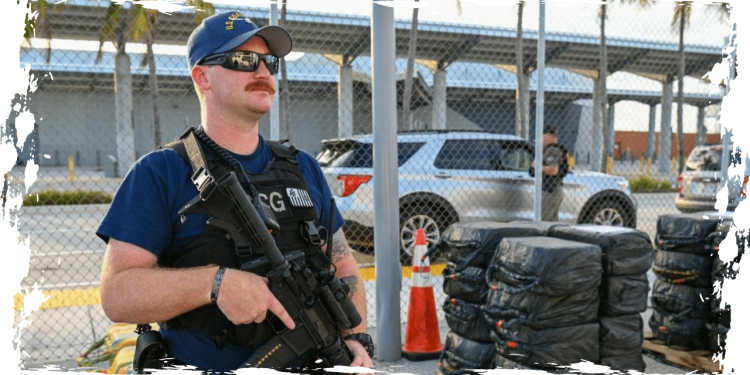On Thursday, the U.S. Coast Guard unloaded over 4,800 pounds of cocaine worth an estimated $63 million at a Florida port. This comes just two days after Coast Guard officers reportedly fired at and sank a speedboat suspected of drug smuggling in the Caribbean Sea.
According to a social media post by the Coast Guard, the cocaine that was offloaded on Thursday resulted from two operations carried out off the coast of Puerto Cabello, Venezuela. The Royal Netherlands Navy patrol boat led the operation, which included a Coast Guard law enforcement detachment and helicopter interdiction tactical squadron.
Just two days after the identification of a suspected drug smuggling vessel in international waters, the announcement of cocaine seizures was made. The Dutch navy ship and U.S. Coast Guard assets in the Caribbean Sea were responsible for both incidents. As per the news release on Thursday, a speedboat was suspected of smuggling narcotics and failed to stop when signaled. Instead, it headed straight towards the Dutch patrol boat.
According to officials, in response to a life-threatening situation, members of the Dutch Navy and U.S. Coast Guard on board a patrol boat discharged their weapons at a speedboat. The purpose of this action was to defend themselves and others. As a result, the speedboat caught fire and sank. Unfortunately, three suspected smugglers went overboard and disappeared below the water, according to the Coast Guard.
Officials have announced that search efforts for the three suspects have been suspended by the U.S. Coast Guard, Royal Netherlands Navy, and Dutch Caribbean Coast Guard on Tuesday evening. Fortunately, there were no reported injuries to either the Dutch or U.S. officers involved in the search.
According to a statement released on Thursday, Lt. Cmdr. John W. Beal emphasized that the Coast Guard serves as the primary agency responsible for enforcing maritime law in the United States. He further added that the dedicated efforts of their crews enable them to safely apprehend suspected smugglers and bring them to face federal prosecution for any alleged crimes.
A week after a separate Coast Guard crew offloaded $468 million worth of cocaine in San Diego, another cocaine seizure took place in the Caribbean Sea. The Coast Guard crew engaged in a shootout during the operation. The combined value of the seized cocaine has yet to be determined, but the haul in San Diego was the result of eight separate operations conducted off the coasts of Mexico and Central and South America.
Drug traffickers around the world often resort to various types of watercraft to transport illegal narcotics. Recently, Italian law enforcement officials discovered a remote-controlled submarine that was likely designed to ferry drugs as part of a global drug trafficking ring. Meanwhile, the French navy reported that it confiscated 2.4 tons of cocaine from a Venezuelan fishing vessel located approximately 1,500 kilometers northeast of Martinique in May.
In March, military ships and planes pursued a speedboat carrying almost four tons of cocaine in the Caribbean Sea off the coast of Colombia. As a result of the chase, authorities were able to seize the massive shipment.
In the previous month, a speedboat attempting to dump its drug cargo into the water near the U.S. Virgin Islands was chased down by a British warship and an American patrol aircraft. After the crew attempted to flee, British sailors and a U.S. Coast Guard team successfully recovered approximately 6,000 pounds of cocaine and other drugs, according to officials.
International drug traffickers often use larger semi-submersibles that cannot fully submerge and are difficult to detect by authorities. These “narco-subs” are frequently intercepted in Colombian waters while en route to the United States, Central America, and Europe.










